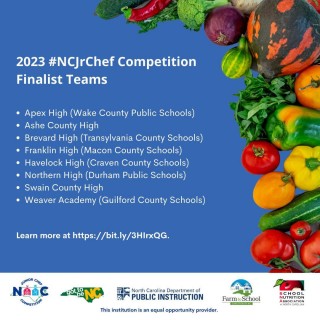
Eight high school teams from across the state will show off their culinary creativity next month in the 2023 North Carolina Jr. Chef Competition. Based on recipes they submitted, the teams selected as finalists to compete in a statewide cook-off are from Apex High (Wake County Public Schools), Ashe County High, Brevard High (Transylvania County Schools), Franklin High (Macon County Schools), Havelock High (Craven County Schools), Northern High (Durham Public Schools), Swain County High, and Weaver Academy (Guilford County Schools).
For the N.C. Jr. Chef Competition, teams of two to four students (grades 9-12) enrolled in North Carolina public schools are challenged to work with either an educator or school nutrition administrator to develop a creative recipe for a school lunch entrée. The recipes must meet the National School Lunch Program nutrition standards, include at least two North Carolina-grown products and one USDA Foods item, be replicable by School Nutrition Programs, and appeal to student tastes. This year, at least one of the two North Carolina-grown ingredients must be cabbage (red or green), dark leafy greens (collard greens, kale, mustard greens, turnip greens, romaine, spinach, Swiss chard), legumes/beans and peas, sweet potatoes, winter squash, or wheat.
For the initial recipe round of the competition, teams submitted their recipes along with nutrient and cost analysis and recipe photos. Based on a review of applications and recipes submitted, the finalist teams were selected to advance to the cook-off phase of the competition.
For the cook-off phase of the competition, which has a deadline of March 10, the student chefs will submit a video of their teams preparing and plating their school lunch entrée recipe. Along with the video, teams will also resubmit their recipes, photos, and nutrient and cost analysis, incorporating feedback from the recipe review panel. In addition, they will submit a work plan for how they will prepare their dish within the 90-minute time limit. Teams will present their dishes March 28 or 29 during virtual, live interviews with a panel of evaluators. Evaluators can ask questions and share feedback with the teams during the interviews. Teams will be evaluated for their ability to work together to demonstrate valuable skills in recipe development, food preparation, safety and sanitation, organization, and presentation and knowledge of nutrition, farm to school, and local food systems.
All N.C. Jr. Chef finalist teams will be recognized, and the results will be announced March 30. Teams will be invited to participate in a virtual awards ceremony with their families, teachers, principals, school nutrition directors, superintendents, and public information officers. Team members will receive N.C. Jr. Chef coats, hats and aprons along with certificates and medals based on team scores. First, second, and third place teams will receive plaques to display in their school, and the first-place team will have the honor of hosting the competition trophy until the next cook-off. Sullivan University in Kentucky will offer scholarships to the student members of the top three teams. The first-place state team will advance to the Southeast Jr. Chef Competition at Sullivan University in May.